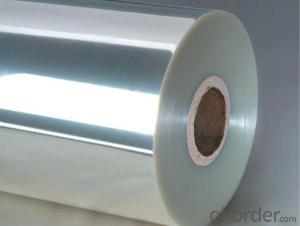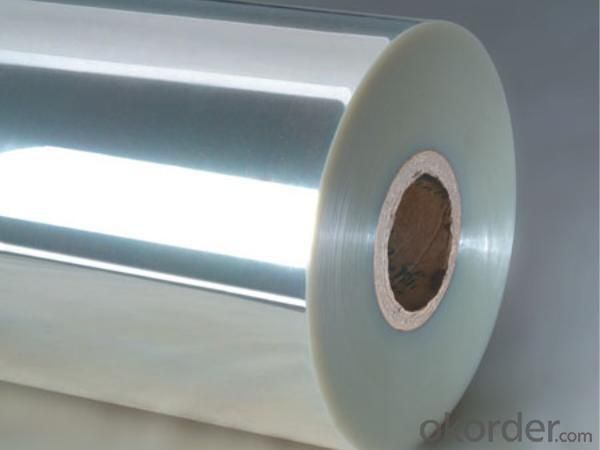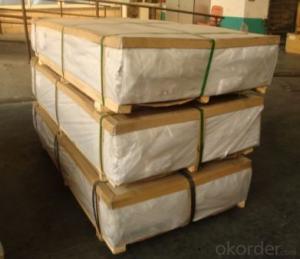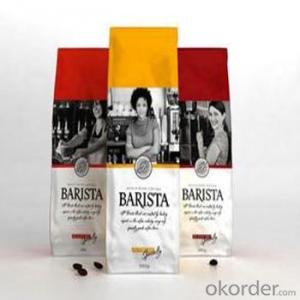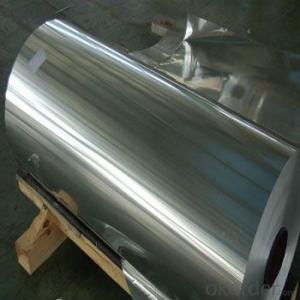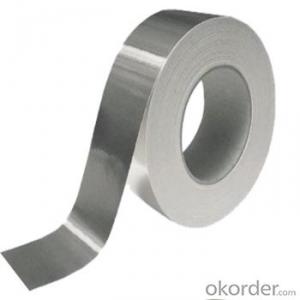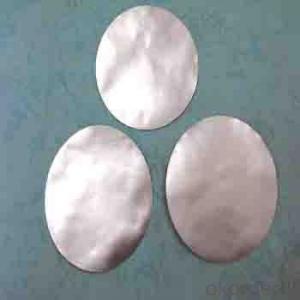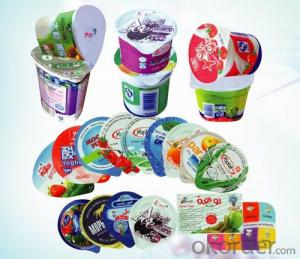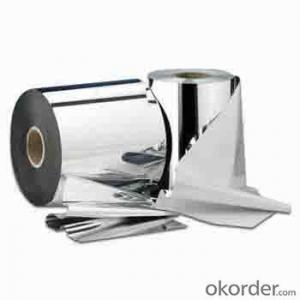Rpr Aluminum Sheets for High-Quality Yogurt Lid Dairy Package Alu Foil
- Loading Port:
- Shanghai
- Payment Terms:
- TT OR LC
- Min Order Qty:
- 1 m.t.
- Supply Capability:
- 1000 m.t./month
OKorder Service Pledge
OKorder Financial Service
You Might Also Like
Specification
1.Specification
lidding foil lidding foils USING ALUMINIUM
Alloy: 8006/8011/8079
Temper:O
Thickness& Tolerance: 0.03mm-0.05mm(±5%)
Width& Tolerance: 200mm-1650mm(±1mm)
Mechanical Properties: Tensile Strength (U.T.S)≥50Mpa, Elongation≥1%
Standard: GB/T3198 /ASTM-B209/EN546
2.Application
Application: Lid of yogurt package, dairy package
3.Detailed Description
Physical
Aluminium is a relatively soft, durable, lightweight, ductile and malleable metal with appearance ranging from silvery to dull gray, depending on the surface roughness. It is nonmagnetic and does not easily ignite. A fresh film of aluminium serves as a good reflector (approximately 92%) of visible light and an excellent reflector (as much as 98%) of medium and far infrared radiation. The yield strength of pure aluminium is 7–11 MPa, while aluminium alloys have yield strengths ranging from 200 MPa to 600 MPa.Aluminium has about one-third the density and stiffness of steel. It is easily machined, cast, drawn and extruded.
Aluminium atoms are arranged in a face-centered cubic (fcc) structure. Aluminium has a stacking-fault energy of approximately 200 mJ/m2.
Aluminium is a good thermal and electrical conductor, having 59% the conductivity of copper, both thermal and electrical, while having only 30% of copper's density. Aluminium is capable of being a superconductor, with a superconducting critical temperature of 1.2 Kelvin and a critical magnetic field of about 100 gauss (10 milliteslas).
Chemical
Corrosion resistance can be excellent due to a thin surface layer of aluminium oxide that forms when the metal is exposed to air, effectively preventing further oxidation.The strongest aluminium alloys are less corrosion resistant due to galvanic reactions with alloyed copper.This corrosion resistance is also often greatly reduced by aqueous salts, particularly in the presence of dissimilar metals.
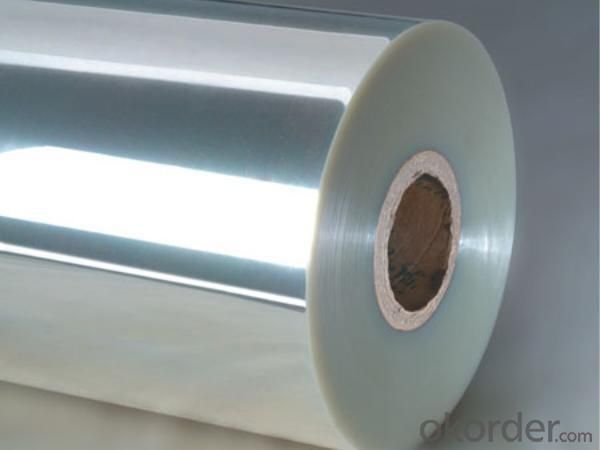
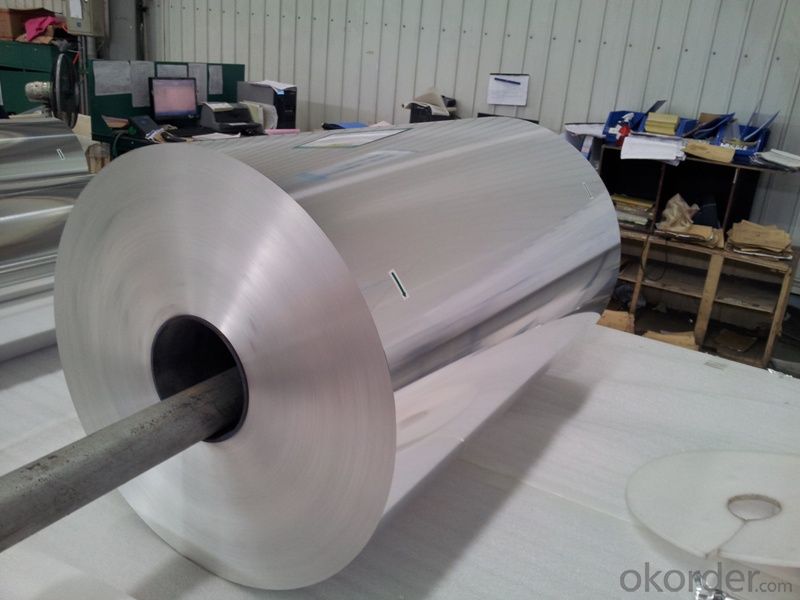
- Q: Are aluminum sheets suitable for wastewater treatment applications?
- Yes, aluminum sheets are suitable for wastewater treatment applications. Aluminum is a versatile material that offers several benefits for use in wastewater treatment processes. Firstly, aluminum sheets are highly resistant to corrosion, which is essential in the harsh and corrosive environment of wastewater treatment plants. This resistance ensures that the aluminum sheets will not deteriorate or react with the chemicals present in the wastewater, thereby maintaining their structural integrity. Additionally, aluminum sheets have excellent thermal conductivity properties, allowing for efficient heat transfer in processes like wastewater disinfection. This thermal conductivity aids in the effective removal of harmful bacteria and contaminants from the wastewater, enhancing the overall treatment process. Furthermore, aluminum sheets are lightweight yet durable, making them easy to handle and install in wastewater treatment systems. This characteristic also contributes to their cost-effectiveness, as they require less maintenance and are less prone to damage compared to other materials. Moreover, aluminum is a sustainable material and can be recycled, reducing the environmental impact of wastewater treatment applications. Recycling aluminum sheets can help conserve natural resources and reduce energy consumption, making it an environmentally friendly choice. In conclusion, aluminum sheets offer numerous advantages for wastewater treatment applications. Their corrosion resistance, thermal conductivity, lightweight nature, and recyclability make them a suitable and efficient material for use in wastewater treatment processes.
- Q: As for graphite and aluminum sheet, which one has a better thermal conductivity?
- aluminum sheet
- Q: Is it possible to utilize aluminum sheets for crafting distinctive architectural structures?
- <p>Yes, aluminum sheets can be used to create unique architectural designs. Known for their strength, durability, and lightweight properties, aluminum sheets are ideal for various architectural applications. They can be easily shaped and cut to fit specific design requirements, offering flexibility in design and construction. Additionally, aluminum's resistance to corrosion and weathering makes it a sustainable choice for long-lasting structures. Architects often use aluminum for facades, roofing, and other exterior elements due to its modern aesthetic and low maintenance needs.</p>
- Q: Can aluminum sheets be used for chemical storage containers?
- Certainly, chemical storage containers can utilize aluminum sheets. Renowned for its exceptional resistance to corrosion, aluminum proves itself as a suitable medium for accommodating a diverse array of chemicals. Its lightweight nature, durability, and lack of reactivity with most substances further enhance its appeal for chemical storage purposes, granting it popularity in this field. Moreover, aluminum boasts the ability to be easily shaped and fashioned into an assortment of dimensions and configurations, affording the luxury of customized container designs. Nonetheless, it is crucial to take into account the specific chemical being stored and seek guidance from experts to ensure compatibility and guarantee safety.
- Q: Is aluminum suitable for projects with heavy traffic or frequent use?
- <p>Yes, aluminum sheets can be used in projects that involve high levels of traffic or heavy use. Aluminum is a lightweight, durable, and corrosion-resistant material. It can withstand significant wear and tear, making it suitable for high-traffic areas. Additionally, aluminum is easy to maintain and can be recycled, which is beneficial for long-term projects. However, it's important to consider the specific grade of aluminum and its thickness to ensure it meets the required strength and durability for your project.</p>
- Q: Are aluminum sheets resistant to vibration?
- Yes, aluminum sheets are generally resistant to vibration due to their inherent strength and durability. The high stiffness-to-weight ratio of aluminum, along with its ability to dampen vibrations, makes it an ideal material for applications requiring vibration resistance.
- Q: Are aluminum sheets resistant to impact?
- Aluminum sheets, in general, have a resistance to impact. With its lightweight nature, aluminum is a metal that possesses both strength and toughness, enabling it to endure impact forces. It boasts remarkable energy absorption qualities, facilitating the absorption and dispersion of impact-generated energy, thereby reducing harm to the sheet. Moreover, aluminum sheets can be fortified further through techniques like heat treatment or alloying, enhancing their impact resistance. Nonetheless, the impact resistance of aluminum sheets may fluctuate based on the particular alloy and thickness employed.
- Q: Can the aluminum sheets be used in food or beverage processing industries?
- Yes, aluminum sheets can be used in food or beverage processing industries. Aluminum is a non-toxic material, and it is widely used in the food and beverage industry due to its excellent properties. Aluminum sheets are resistant to corrosion, lightweight, and have good thermal conductivity. These properties make them ideal for various applications in food and beverage processing industries, such as food packaging, cooking utensils, storage containers, and beverage cans. Additionally, aluminum is a sustainable material as it can be recycled, which further enhances its suitability for use in these industries.
- Q: Can aluminum sheets be etched or engraved?
- Yes, aluminum sheets can be etched or engraved.
- Q: Can aluminum sheet be used for automotive applications?
- Yes, aluminum sheet can be used for automotive applications. Aluminum is a lightweight and strong material that offers several advantages in the automotive industry. It is widely used in the production of car bodies, hoods, doors, and other structural components. Aluminum sheets are preferred for these applications because they provide excellent strength-to-weight ratio, corrosion resistance, and durability. Additionally, aluminum is easily formable, which allows for complex shapes and designs to be achieved. The use of aluminum in automotive applications also helps to improve fuel efficiency and reduce emissions due to its lighter weight. Overall, aluminum sheet is a suitable choice for automotive applications due to its numerous beneficial properties.
Send your message to us
Rpr Aluminum Sheets for High-Quality Yogurt Lid Dairy Package Alu Foil
- Loading Port:
- Shanghai
- Payment Terms:
- TT OR LC
- Min Order Qty:
- 1 m.t.
- Supply Capability:
- 1000 m.t./month
OKorder Service Pledge
OKorder Financial Service
Similar products
Hot products
Hot Searches
Related keywords
